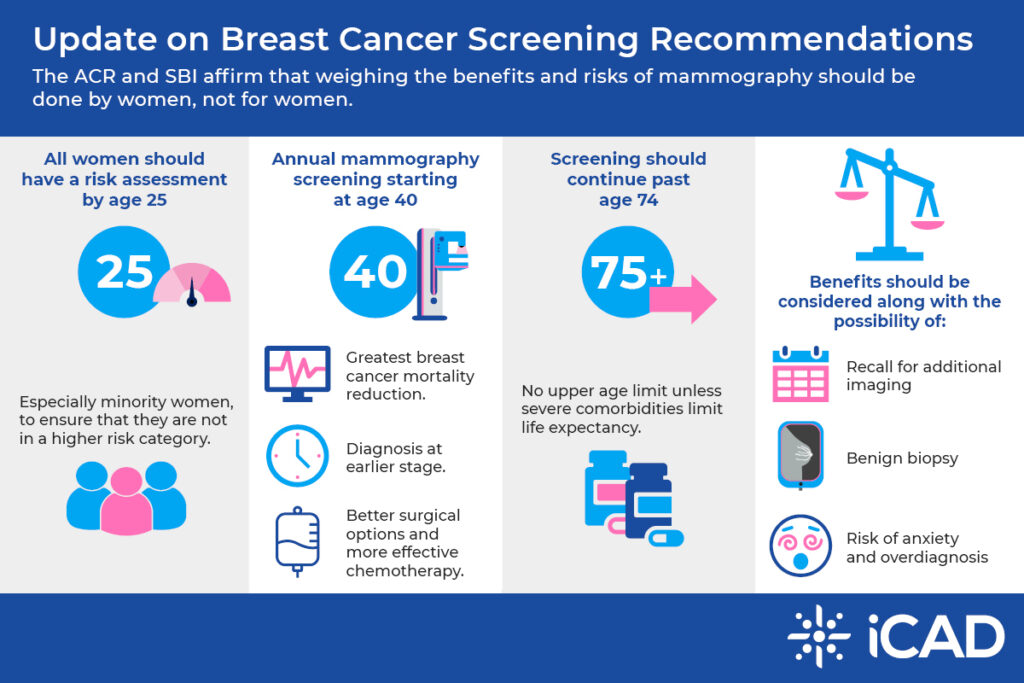Know Before: Breast Cancer Risk Factors at Every Age
As we recognize Women’s Health Month, we want to celebrate the moms, grandmothers, sisters, daughters, aunts, nieces, and cousins who are making a profound impact in their communities, paving the way for a healthier future, and inspiring hope for generations to come. Breast cancer is a significant health concern affecting women at various stages of their lives, with factors like breast density playing a crucial role in both risk and detection.
Here’s a guide on what women starting at 25, those aged 40-74, and women older than 75 need to know about breast health, including understanding their breast density and assessing their risk levels.

Graphic adapted from Monticciolo et al. 2021 Journal of the American College of Radiology
For Women at 25: Risk Assessment is Essential for Early Detection
Younger women often have denser breast tissue, which can make cancer detection more challenging and increase the overall risk of breast cancer. It’s essential for women in this age group, especially those with a family history of breast cancer, to discuss options for determining their breast density and understanding their individual breast cancer risk with their healthcare provider. Initiating regular screening discussions during your annual physical or well-women exam based on personal risk factors, and considering a baseline screening, are proactive steps you can take.
All women should undergo risk assessment by age 25, especially Black women and women of Ashkenazi Jewish heritage, so that those at higher-than-average risk can be identified and appropriate screening initiated.1 For individuals at higher-than-average risk, a mammogram, or other screening modalities such as an MRI, may be recommended starting at the age of 25-30.
For Women 40-74: Regular Screening and Understanding Breast Density
For average risk women, the ACR and Society of Breast Imaging recommend annual mammography screening beginning at age 40,2 which provides the greatest mortality reduction, diagnosis at earlier stage, better surgical options, and more effective chemotherapy.
As women age, breast density typically decreases, which can improve the efficacy of traditional mammograms. However, for those who continue to have dense breasts, it’s important to be aware that mammograms might be less effective at detecting tumors. Women should get regular mammographic screenings and may also need additional imaging tests like ultrasound or MRI, based on the physician’s recommendations. AI tools such as iCAD’s ProFound Breast Health Suite helps radiologists identify cancers earlier.
Regular risk assessments are crucial, as the lifetime risk can evolve based on factors such as changes in health status, family history, and hormone exposure such as pregnancy and menopause. Keeping an eye on lifestyle factors that influence risk, such as diet, exercise, and alcohol consumption, is also beneficial.
For Women at 75: Stay Vigilant with a Personalized Screening Plan
Screening should continue past age 74 years,2 without an upper age limit unless severe comorbidities limit life expectancy. For those over 75, the decision to continue regular mammograms should be based on individual health status, risk factors such as breast density, and previous screening results.
Discussions with healthcare providers should focus on the pros and cons of continued screening, as well as ongoing assessment of breast density and cancer risk. Older women should remain vigilant about any new changes in their breast health and report them promptly.
Staying Informed and Proactive at Every Age
Awareness of the personal risk factors like breast density, clinical and family history, genetic markers, and hormone exposure is crucial for effective screening and early detection of breast cancer across all ages. Advancements in technology, such as AI-powered mammography, are improving the accuracy of detecting cancer, even in dense breast tissue, offering hope for better outcomes.
Women should consult their healthcare providers to understand their specific breast density, evaluate their risk of breast cancer regularly, and tailor their screening strategy accordingly which may include supplemental screening strategies. With a few key precautions in every age group, women can significantly enhance their chances for early detection and successful management of breast cancer.

Mammograms are unique, just like you.
Make a plan to advocate for your health! Visit the patient resource page to learn about additional resources and options that can be tailored just for you.
References
1. https://www.jacr.org/article/S1546-1440(23)00334-4/abstract
2. https://www.jacr.org/article/S1546-1440(21)00383-5/fulltext
